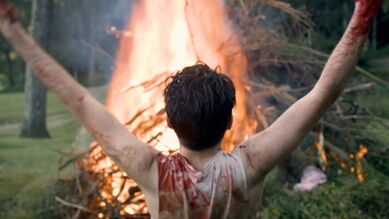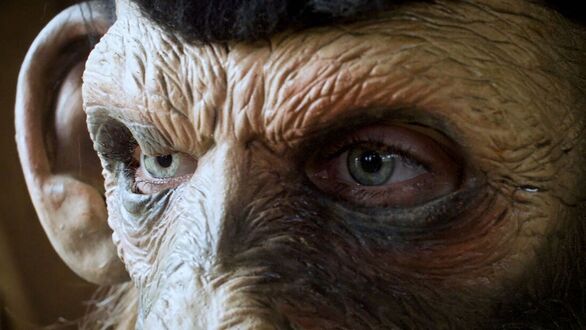 So, this year a particular theme seems embedded in quite a few of the newly released horror films. This theme is in no way a new concept and in fact the plot style actually takes its name from a short story written in 1924 by Richard Connell called “The Most Dangerous Game.” For those unfamiliar with the story, the premise involves hunting humans for sport... ...Supposedly, people prove an acceptable challenge because of their ability to think and even outwit the hunter. A few of the films which fall into this category include The Furies¸ Ready or Not, The Hunt (which none of us will see), and now American Hunt. Why the sudden surge in human hunting-season movies? What topical example could we possibly find to explain this current trend in film? Perhaps exploring Aaron Mirtes’ (Curse of the Nun, Clowntergeist) film will help us understand why filmmakers and audiences continue watching people track and kill each other. Or maybe this new movie will help expand on the psychological portrayal of human hunters. Mirtes wastes no time including the viewer in the action as we encounter the remaining moments of a hunt. A cheerful acoustic folk song piped through unseen loud-speakers becomes the soundtrack for a monkey-mask wearing man with a shotgun as he tracks a woman to a nearby barn. After the kill, the masked hunter reveals his identity as Memphis (Brad Belemjian) and he and his brother Levi (Taylor Novak) joke about their fresh kill and demonstrate their sibling rivalry. The initial interaction between the brothers shows they view hunting humans as a competition between the two of them. The very next scene, Levi brings three “friends” to his farm for a hunting trip. Everyone but the passive Kimberly (Lucy Hartselle) seems on board for shooting some deer, so Levi tries educating his soon-to-be victims about the importance of hunting and how it’s a “kill or be killed world.” After a rude awakening the next morning, Levi and Memphis explain to the group of friends how they are going to play “the Most Dangerous Game.” Kimberley, Brooke, and Owen have ten minutes to hide before the brothers will come for them. However, the trio stand around and argue how they “should have seen this” and start asking themselves if there were any red flags. For one, do we live in such a world where we should assume our friends will hunt us for sport? Second, Memphis’ shirt is covered in blood from the previous hunt, so yes, there was a red flag. Lines of razor blades, electric fences, and various traps keep the victims contained, but also their bickering plays a large role in why they remain so slow moving. The character of Owen (Cris Ruiz) seems low-key thrilled about their situation because it allows him to take charge and quote such predictable lines as “hunt or be hunted.” The thrill of hunting humans comes from the fact the people are smart enough to escape. Just not this particular group of people. Owen sticks his hand in an animal trap and even with an obviously crushed hand and blood loss he still is able to spew forth lines of manliness and devotion to his true love, Kim. The small cast makes it easy for each character to show growth and get ample amount of screen time, but the limited amount of people also makes the weaker performances and over-acting a lot more noticeable. Neither Owen nor Brooke (Allison Shrum) add a terrible amount to the film, but Hartselle gives a convincing (however sometimes) predictable portrayal of the final girl. However, some strong acting comes from the brothers and specifically when they interact with each other. The competition between the victims and the hunters remains the major plot line, but the rivalry between the brothers brings a significant amount of drama as well. The brothers present some interesting interactions as the younger man wants the hunt to include torture and toying with the victims, while Levi insists on good sportsmanship. Memphis and Levi argue every time they appear on screen together because of their differing approaches to hunting. Levi comes off as a traditionalist, but Memphis enjoys the thrill of scaring the victim and the monetary value which comes from collecting their parts after death. The inclusion of the side character of Pastor Greene (David Ditmore) allows Mirtes to make some commentary on how hiding behind religion allows for a significant amount of naiveté from observers. The homicidal brothers claim (for the sake of the preacher) that they hold a certain level of devotion to Christianity, however their victims and audience receive hints of the occult. During the first interior shot of the barn we see a Ouija board and a pentagram nailed to the wall as if their worship leads the brothers to perform dark deeds. Nevertheless, no higher power leads these sadistic siblings (except perhaps the all mighty dollar) because Memphis and Levi simply hunt people for laughs and some friendly sibling competition. Mirtes gives us a simple premise and we get exactly what we are expecting from the film, but then the movie just won’t end. I am not a fan of the “not-ending endings” so many filmmakers rely on now. Instead of finishing the film, they include (usually mid or post credits) the beginning of the next film. So, expect a few extra scenes after the film should have come to a close. Overall, American Hunt does not add much to the “most dangerous game” genre, but I would say try to just enjoy the thrill of the hunt and not necessarily the end results. American Hunt is now hunting on VOD from High Octane Pictures. By Amylou Ahava (Like Amylou's writing? Tip her here at Ko-fi!)
0 Comments
Leave a Reply. |
Archives
March 2023
|


 RSS Feed
RSS Feed